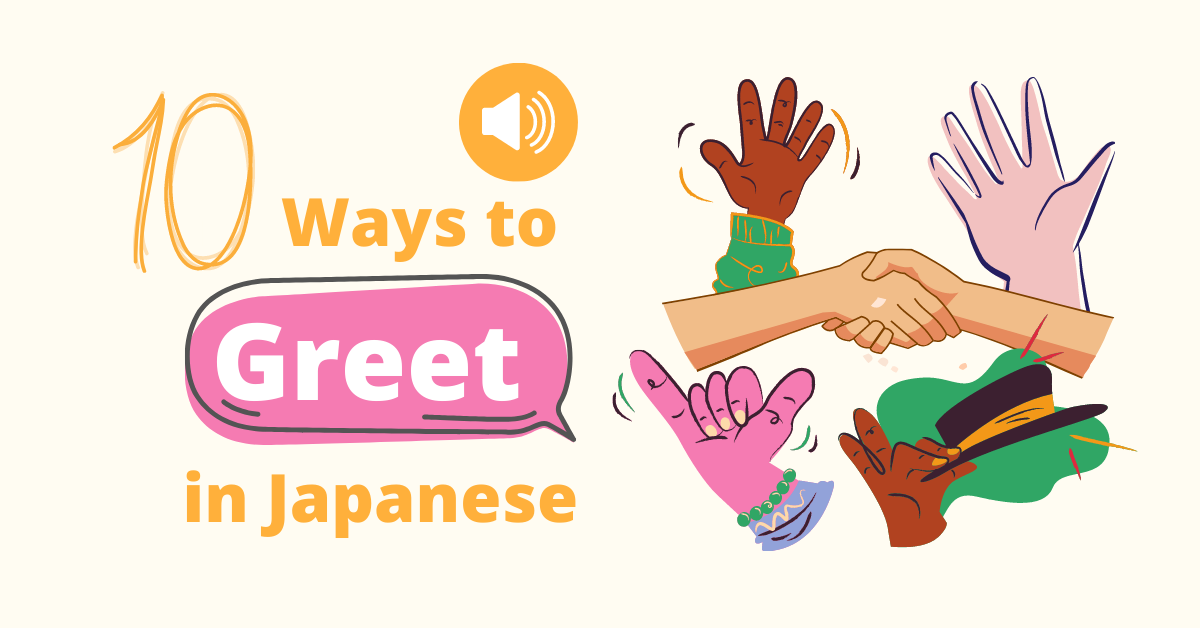The word 挨拶 – pronounced “ai-satsu” translates to “greeting” in English, but, there are varieties of ways we express “hello” in Japanese.
Greetings are one of the first things you learn when getting introduced to any language. In Japan, there are different versions of a greeting depending on the context of a conversation. Levels of formality also differ depending on who you are greeting – could be a teacher, friend, family, or a stranger. Therefore it is necessary to understand how to appropriately greet in Japanese if you are planning on living or studying in Japan.
In this article, we will review 10 common ways to greet in Japanese. Mastering different ways to greet in Japanese will take you a step ahead of your communication with the locals in Japan!

1. こんにちは – “Konnichiwa”
Konnichiwa is the most well-known Japanese greeting. It is one of the first words Japanese learners encounter when getting started. The word translates to “hello” in English, and it can be used at any hour of the day. However, it is most commonly used in the afternoon while the sun is up. The Kanji is 「今日」は, which is a combination of the word “today” and “sun”.
The word applies to many kinds of situations. You may use Konnichiwa in casual greetings such as “hey” or “hi” in English towards friends or relatives. It is also practical in formal tones. Konnichiwa is a “safe” and convenient way to greet in any social situation!
2. おはようございます – “Ohayō gozaimasu”
Ohayō gozaimasu is used in the morning hours before noon. The word translates to “good morning” in English. The Kanji is お「早」うございます, which means “early.”
Good morning can be expressed in 2 ways. In casual greetings, “Ohayō” – without the “gozaimasu” is an appropriate expression. In a formal greeting towards a teacher or stranger, “Ohayō gozaimasu” – the full phrase with the “gozaimasu” is essential.
3. こんばんは – “Konbanwa”
Konbanwa is used in the night hours after the sunset. The word translates to “good night” in English. The Kanji is 「今晩」は, which means “tonight.”
Similar to the word Konnichiwa, Konbanwa is used when greeting relatives, teachers, and strangers. It is not practical in a casual tone where you are greeting a friend or a family. The word sounds more formal, and most people do not use it with their close acquaintances.
4. おやすみなさい – “Oyasumi-nasai”
Oyasumi-nasai is used before sleeping. The word literally translates to “good night,” however the nuance is slightly different from Konbanwa. The more accurate expression in English would be “please rest,” or “Have a good sleep.”
5. さようなら – “Sayōnara”
Sayōnara is used when you farewell your acquaintances. The word translates to “if it is so,” but the more accurate expression would be “goodbye.
During the Meiji period, men used the word for farewell, and women responded with “gokigenyō” – which translates to “farewell” in English. Around the Showa period is when women started using Sayōnara, and this is how Sayōnara became a national farewell greeting. In a casual tone, the word can be replaced by “bye-bye” or “mata-ne.”
6.また〜 – “Mata~”
Mata translates to “again” in English. Similar to Sayōnara the word is used in farewells. In most cases, we combine Mata~ with a date or time. For example, the most common expression used is “Mata ashita” and “Mata kondo” – which means “see you tomorrow” and “see you next time.”
It is also appropriate to simply use Mata, which means “later.” The word sounds casual, and most people use it with their close acquaintances. A formal expression of the word would be “dewa.”
7. 行ってきます・行ってらっしゃい – “Ittekimasu・Itterasshai”
Ittekimasu and Itterasshai are greetings specifically used for when someone leaves the house, which is a cultural concept of Japanese people. Ittekimasu translates to “I’m leaving and I will come back.” Itterasshai on the other hand translates to “be safe and come back.”
The words are most commonly heard in a daily morning conversation between children to mother or husband to wife. The word has a casual and formal undertone, and most people use it with their families in the household.
8. ただいま・お帰りなさい – “Tadaima・Okaeri-nasai”
Similar to Ittekimasu and Itterasshai, Tadaima and Okaeri-nasai are greetings specifically used for when someone returns home. Tadaima translates to “I’m back,” and Okaeri-nasai translates to “welcome back.”
9. もしもし – “Moshi-moshi”
Moshi-moshi is a common greeting that is exclusively used on the phone. When you call a Japanese person, you will most likely hear them greet you with the “Moshi-moshi” on the phone. We always use this word at the beginning of the conversation to confirm both parties can hear each other’s voices.
In a business setting, a more appropriate way to answer the phone would be “hai” – which translates to “yes” in English. The word will be followed by the responder’s name or company. In the context of business deals, the caller will most often say, “Osewa ni natte orimasu” to express appreciation for the corporation.
10. お疲れ様です – “Otsukaresama desu”
Otsukarasama desu is the most commonly used greeting in the workplace towards your boss and colleagues. The word means to recognize “good work” or a similar expression to a pad on the back for hard work. The Kanji is お「疲」れ様, which means “to get tired.”
